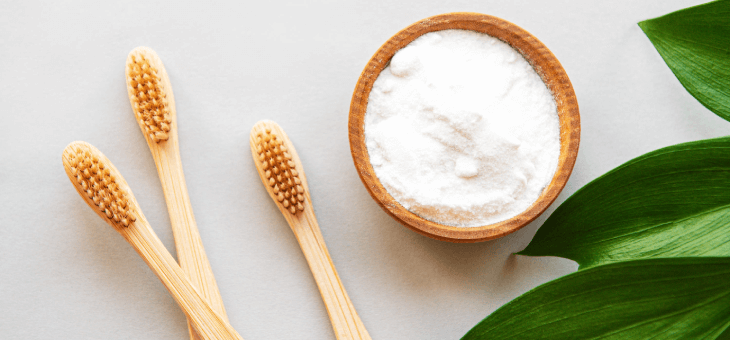It’s hard not to love a DIY health and beauty hack – but not all of them are legitimate, or even safe.
The latest trend is all about using baking soda, or bicarbonate of soda, to get whiter teeth. It sounds like the perfect remedy – all you have to do is brush your teeth with something you probably already have in your kitchen cupboard, and you’re well on your way to pearly whites, apparently.
People on TikTok have been mixing baking soda into a toothpaste with hydrogen peroxide (a mild antiseptic often used as mouthwash).
However, as with many things you see on social media, all is perhaps not as it seems. According to certified dentist Dr Vanessa Creaven, baking soda and baking powder are basically the same when it comes to your teeth – and neither are a great idea.
“Baking soda is just sodium bicarb, baking powder is sodium bicarb plus an acid,” she says.
“We definitely would not recommend using baking powder as a method to whiten your teeth. Baking powder is very abrasive to the tooth surface and acts by breaking and abrading down the outside layer of the tooth surface rather than actually brightening the tooth.”
Read: Dental expert tells what happens to our teeth as we age
While you might see some toothpastes containing baking soda, this isn’t the same as putting the pure product on your teeth. Dr Creaven explains that these toothpastes contain a very small and controlled amount of the product.
“The concentrate of neat baking powder, which we have seen used on social media and home hack videos, is far too abrasive on the tooth. The level of ingredient the consumer applies is uncontrolled, one person may use a 1/4 of a teaspoon mixed with water and the next could be using one tablespoon,” says Dr Creaven.
Read: Pros and cons of teeth whitening
Chances are this isn’t the first time you’ve heard of baking powder or soda being used as an at-home whitener – it’s long been lauded as a natural way to clear up stained teeth. However, Dr Creaven says: “Teeth whitening should be a chemical process where the active ingredient is placed onto the tooth surface and lifts the stains from the tooth surface via an oxidation process.
“When you combine hydrogen peroxide with baking powder and brush it off, the baking powder is just abrading away the tooth surface while the hydrogen peroxide doesn’t have time to actually achieve any brightness.”
For cosmetic dentist Dr Rhona Eskander, the main problem with this hack is that people are self-diagnosing and deciding something is wrong with their teeth. “It’s hugely risky to self-diagnose,” she says. “Why are your teeth yellow? Are you suffering from gum disease or recession? If so you can cause more harm doing home remedies – please see a dentist.”
Read: Five myths and facts about keeping your teeth healthy
She agrees that using baking soda as a DIY tooth whitener is not a good idea, saying: “If you use too much you can damage your teeth at home due to the abrasives, so I wouldn’t risk it.”
This isn’t the first time bicarbonate of soda has gone viral for its purported health benefits. Every so often, drinking baking soda dissolved into water sweeps social media as a hot new diet trend. Even though it might be easily accessible, cheap and seem like a quick fix, it almost goes without saying – it’s not an effective diet product, and might cause more harm than good to your health.
– With PA

